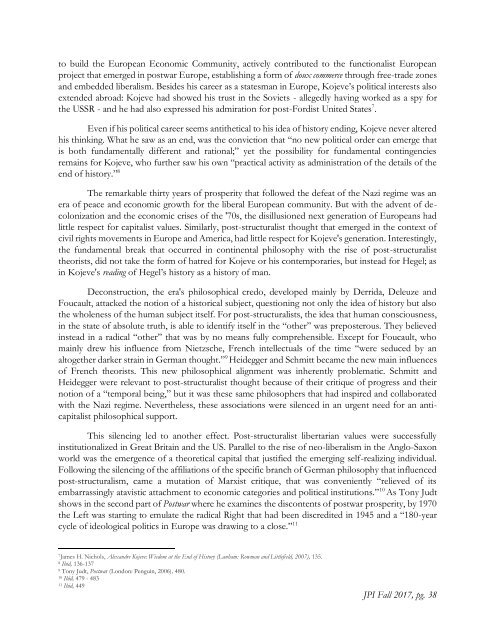Fall 2017 JPI
Create successful ePaper yourself
Turn your PDF publications into a flip-book with our unique Google optimized e-Paper software.
to build the European Economic Community, actively contributed to the functionalist European<br />
project that emerged in postwar Europe, establishing a form of doux commerce through free-trade zones<br />
and embedded liberalism. Besides his career as a statesman in Europe, Kojeve’s political interests also<br />
extended abroad: Kojeve had showed his trust in the Soviets - allegedly having worked as a spy for<br />
the USSR - and he had also expressed his admiration for post-Fordist United States 7 .<br />
Even if his political career seems antithetical to his idea of history ending, Kojeve never altered<br />
his thinking. What he saw as an end, was the conviction that “no new political order can emerge that<br />
is both fundamentally different and rational;” yet the possibility for fundamental contingencies<br />
remains for Kojeve, who further saw his own “practical activity as administration of the details of the<br />
end of history.” 8<br />
The remarkable thirty years of prosperity that followed the defeat of the Nazi regime was an<br />
era of peace and economic growth for the liberal European community. But with the advent of decolonization<br />
and the economic crises of the '70s, the disillusioned next generation of Europeans had<br />
little respect for capitalist values. Similarly, post-structuralist thought that emerged in the context of<br />
civil rights movements in Europe and America, had little respect for Kojeve's generation. Interestingly,<br />
the fundamental break that occurred in continental philosophy with the rise of post-structuralist<br />
theorists, did not take the form of hatred for Kojeve or his contemporaries, but instead for Hegel; as<br />
in Kojeve's reading of Hegel’s history as a history of man.<br />
Deconstruction, the era's philosophical credo, developed mainly by Derrida, Deleuze and<br />
Foucault, attacked the notion of a historical subject, questioning not only the idea of history but also<br />
the wholeness of the human subject itself. For post-structuralists, the idea that human consciousness,<br />
in the state of absolute truth, is able to identify itself in the “other” was preposterous. They believed<br />
instead in a radical “other” that was by no means fully comprehensible. Except for Foucault, who<br />
mainly drew his influence from Nietzsche, French intellectuals of the time “were seduced by an<br />
altogether darker strain in German thought.” 9 Heidegger and Schmitt became the new main influences<br />
of French theorists. This new philosophical alignment was inherently problematic. Schmitt and<br />
Heidegger were relevant to post-structuralist thought because of their critique of progress and their<br />
notion of a “temporal being,” but it was these same philosophers that had inspired and collaborated<br />
with the Nazi regime. Nevertheless, these associations were silenced in an urgent need for an anticapitalist<br />
philosophical support.<br />
This silencing led to another effect. Post-structuralist libertarian values were successfully<br />
institutionalized in Great Britain and the US. Parallel to the rise of neo-liberalism in the Anglo-Saxon<br />
world was the emergence of a theoretical capital that justified the emerging self-realizing individual.<br />
Following the silencing of the affiliations of the specific branch of German philosophy that influenced<br />
post-structuralism, came a mutation of Marxist critique, that was conveniently “relieved of its<br />
embarrassingly atavistic attachment to economic categories and political institutions.” 10 As Tony Judt<br />
shows in the second part of Postwar where he examines the discontents of postwar prosperity, by 1970<br />
the Left was starting to emulate the radical Right that had been discredited in 1945 and a “180-year<br />
cycle of ideological politics in Europe was drawing to a close.” 11<br />
7James H. Nichols, Alexandre Kojeve: Wisdom at the End of History (Lanham: Rowman and Littlefield, 2007), 135.<br />
8 Ibid, 136-137<br />
9 Tony Judt, Postwar (London: Penguin, 2006), 480.<br />
10 Ibid, 479 - 483<br />
11 Ibid, 449<br />
<strong>JPI</strong> <strong>Fall</strong> <strong>2017</strong>, pg. 38
















